...
Put simply, a token is a digital representation of a real-world asset on the blockchain, where it is secured by both a public key (the location on the blockchain where it resides) and a private key (unique to the owner of the asset). Transactions involve changing ownership of the asset rather than its physical location, through digital contracts rather than traditional contracts.
In theory, any number of financial assets could be tokenized, including bonds, mutual funds and other securities, commercial real estate property and dollars. The process is most helpful in situations where transactions are complicated, such as business-to-business or cross-border payments, rather than peer-to-peer payments, which can already take place instantly through services such as Zelle.
Blockchain-based tokenization is not to be confused with credit card tokenization, where a card's primary account number is replaced by a "token," or a set of randomly generated numbers, to secure digital payments.
There are numerous benefits in financial services, from automated and highly auditable recordkeeping to fast payments that can take place across borders at any time of day. Efforts are likely to rise as blockchain technology becomes more accessible.
There is, or will be, "a fear of missing out," said Sudhir Pai, chief technology and innovation officer at the technology consulting firm Capgemini.
Tokenization makes the most sense for large global banks, which are active in trade finance, international payments, corporate treasury and financial markets, said Olsen, whereas smaller banks are less likely to have the resources or business case to justify it before they see how other ventures pan out.
...
Experts say there are a number of advantages and applications for financial services companies.
"Because tokenization takes place on an append-only database [that is, one keeps adding information to it], it becomes a perfectly auditable history of that asset," said Matt Higginson, who leads distributed-ledger technology initiatives globally at McKinsey. "We can see when it was created, who owned or had the keys, when it was transferred to someone else. That becomes very attractive in financial services."
Tokenization can make inaccessible items easier to trade to a wider audience.
"I don't need to trade an ounce or gram of gold," said Higginson, as one example. "I can take that token and fractionalize it down to billionths or trillionths of a token and sell that little piece. This is attractive because we are opening the investment market to a wider variety of people, who may have smaller budgets."
It also makes trading quicker and less expensive for the custodian and buyer, if it can happen automatically at any time of day from a digital wallet. It solves the "double spend" problem, meaning the asset cannot be transacted more than once, said Higginson, because its change of ownership will be automatically recorded on the blockchain.
"That happens through a network of computers without humans doing any verification," said Higginson. "It gives people confidence that what they own is the real thing. There is no cheating or committing fraud."
Beyond efficiency, growth potential is another big reason financial services companies are or will turn to tokenization, Pai said.
"There are a tremendous amount of illiquid assets available in the world today," such as art or real estate, he said. "A capital markets or exchange business can introduce new securities."
Still, there are numerous reasons why banks are in the early stages of experimentation. Banks are still at the proof-of-concept stage for many use cases and are determining the right type of blockchain and how to keep assets secure, said Higginson.
"Tokenizing everything is technically possible, but operationally it is very complex," said Pai.
Financial institutions may be unmotivated to build a new technology stack, prioritizing experimentations with the buzzier space of generative artificial intelligence, and hesitant to enter an arena where regulation is still murky.
"We spend a lot of time making sure our regulators are comfortable with how this new technology is applied and how it is used in our businesses day to day," said Lobban.
Finally, to make tokenization work at scale, "it's not about one bank having a platform and looking at tokenization," said Pai. "It will only work when there is an ecosystem around tokenization."
For instance, several banks would need to align to tokenize syndicated loans, said Olsen.
"A lot of benefits only accrue when you have a network of banks using it," he said.
Nadine Chakar, global head of DTCC Digital Assets at the Depository Trust and Clearing Corp., believes now is the time for financial services players to collaborate instead of compete.
...






















